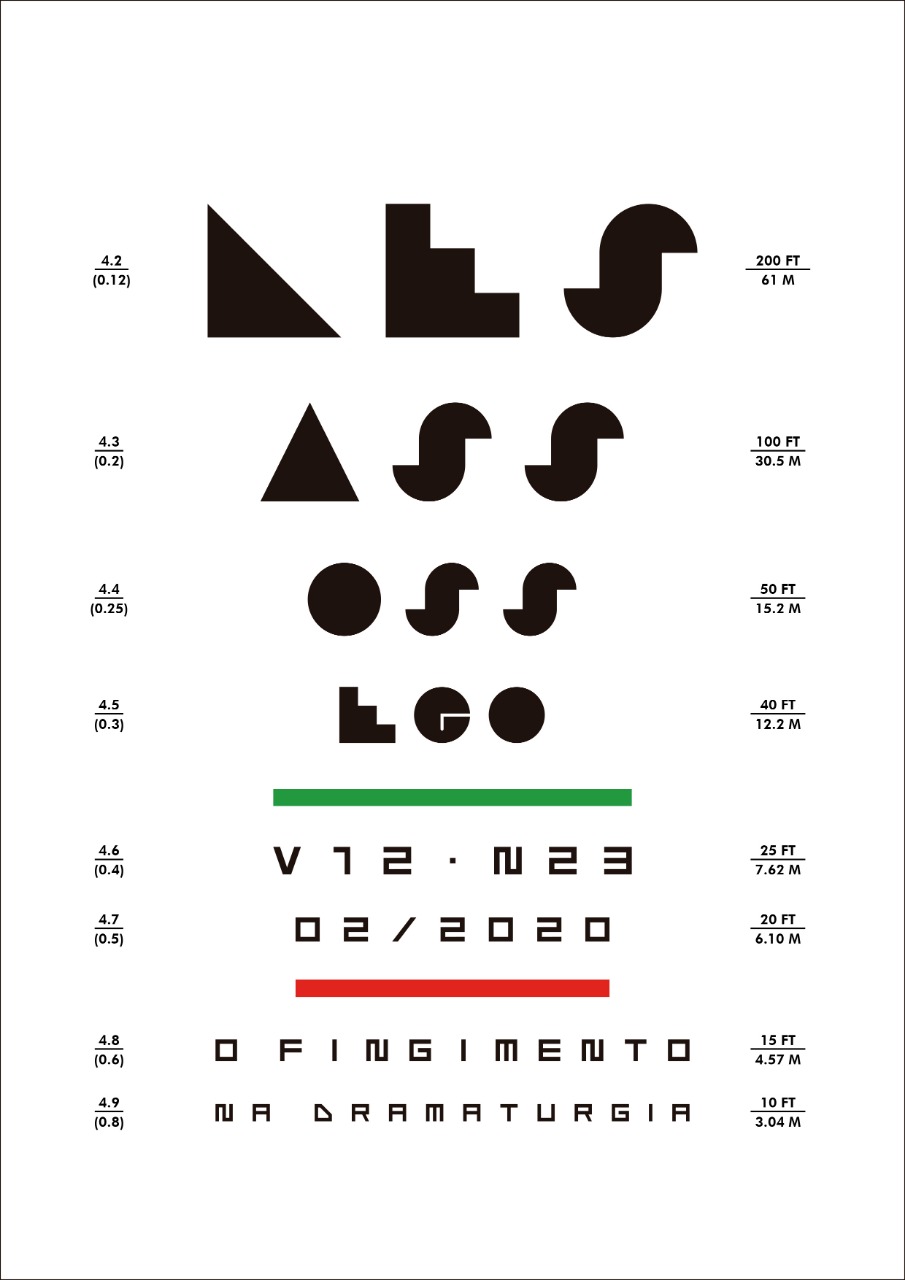Pretending and Baroque: the developments of identity in "Anfitrião ou Júpiter e Alcmena", by Antônio José da Silva
DOI:
https://doi.org/10.11606/issn.2175-3180.v12i23p133-155Keywords:
Antônio José da Silva, Baroque, Pretending, AmphitryonAbstract
In this article we will deal with the play Anfitrião ou Júpiter e Alcmena (1736), by Antônio José da Silva (1705-1739), considering the pretending as appropriation of identity: Jupiter becomes Amphitryon, and the same does Mercury in relation to Saramago. We note that the Luso-Brazilian author, by way of overcoming the Plautino model and its intertextual paradigms, reinforces the multiplication processes in his play, adding developments to the initial mythos. In this sense, we can identify several unfolding procedures, among which: the division of the “Form-Amphitryon” into husband (Amphitryon himself) and lover (Jupiter in disguise); the insertion of Juno and Íris as a factor of opposition to Jupiter's love adventure and, consequently, to the main action branching. For this, we relate the strategy of pretending the characters to the unfolding processes carried out by the comedian. In the play in question, the character Juno unfolds her identity twice, pretending to be Felizarda and then Flérida. We also discuss the love quadrangles, which also occur as unfoldings: in parallel to the love games between the discreet (Amphitryon / Alcmena / Jupiter / Juno), we will have the comic action, which is given by the quiproquós between Mercury / Cornucopia / Saramago / Iris. Therefore, we found that the unfolding processes that characterize the Baroque aesthetic are manifested both in the structure of the serious and comic intrigues of the play and in the variations of the characters' identity, with Antônio José da Silva investing heavily in this resource, in an almost dizzying way.
Downloads
References
BENJAMIN, Walter. Origem do drama barroco alemão. Tradução de Sérgio Paulo Rouanet. São Paulo: Brasiliense, 1984.
CAVAILLÉ, Jean-Pierre. Descartes: a fábula do mundo. Tradução de Miguel Serras Pereira. Lisboa: Instituto Piaget, 1996.
DELEUZE, Gilles. A dobra: Leibniz e o Barroco. Campinas: Papirus, 2000.
DESCARTES, René. Meditações. Obra escolhida. 3ª ed. Introdução de Gilles-Gaston Granger. Prefácio e notas de Gérard Lebrun. Tradução de J. Guinsburg e Bento Prado Júnior. 3ª edição. Rio de Janeiro: Bertrand Brasil, 1994. p. 105-198.
MARCELLO, Benedetto. O teatro à moda. Tradução de Ligiana Costa. São Paulo: Editora Unesp, 2010.
MÍSSIO, Edmir. A civilidade e as artes de fingir: a partir do conceito de dissimulação honesta de Torquato Accetto. São Paulo: Edusp, 2012.
PAVIS, Patrice. Dicionário de teatro. Tradução de Jacó Guinsburg e M. Lúcia Pereira. São Paulo: Perspectiva, 2008.
PLAUTO. Anfitrião. Introdução, tradução e notas de Carlos Alberto Louro Fonseca. Lisboa: Edições 70, 1993.
REBELLO, Luiz Francisco. História do teatro português. 2ª edição. Lisboa: Publicações Europa-América, 1972.
SILVA, António José da. Obras completas. Prefácio e notas do Prof. José Pereira Tavares. Lisboa: Sá da Costa, 1958. 4.v.
Downloads
Published
Issue
Section
License
Copyright (c) 2020 Eduardo Neves Silva

This work is licensed under a Creative Commons Attribution-NonCommercial 4.0 International License.
O(s) autor(es) declara(m) automaticamente ao enviar um texto para publicação na revista Desassossego que o trabalho é de sua(s) autoria(s), assumindo total responsabilidade perante a lei nº 9.610, de 19 de fevereiro de 1998, no caso de plágio ou difamação, obrigando-se a responder pela originalidade do trabalho, inclusive por citações, transcrições, uso de nomes de pessoas e lugares, referências histórias e bibliográficas e tudo o mais que tiver sido incorporado ao seu texto, eximindo, desde já a equipe da Revista, bem como os organismos editoriais a ela vinculados de quaisquer prejuízos ou danos.
O(s) autor(s) permanece(m) sendo o(s) detentor(es) dos direitos autorais de seu(s) texto(s), mas autoriza(m) a equipe da Revista Desassossego a revisar, editar e publicar o texto, podendo esta sugerir alterações sempre que necessário.
O autor(s) declara(m) que sobre o seu texto não recai ônus de qualquer espécie, assim como a inexistência de contratos editoriais vigentes que impeçam sua publicação na Revista Desassossego, responsabilizando-se por reivindicações futuras e eventuais perdas e danos. Os originais enviados devem ser inéditos e não devem ser submetidos à outra(s) revista(s) durante o processo de avaliação.
Em casos de coautoria com respectivos orientadores e outros, faz-se necessária uma declaração do coautor autorizando a publicação do texto.
Entende-se, portanto, com o ato de submissão de qualquer material à Revista Desassossego, a plena concordância com estes termos e com as Normas para elaboração e submissão de trabalhos. O não cumprimento desses itens ou o não enquadramento às normas editoriais resultará na recusa do material.


